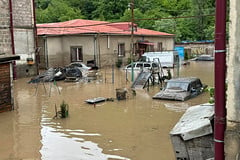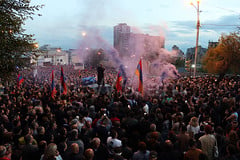
We must fundamentally reflect on the concept with which the Nagorno-Karabakh issue was pursued during the years of our independence. Prime Minister Nikol Pashinyan stat this during Wednesday’s question-and-answer session at the National Assembly of Armenia.
"There we have two parts: before the Madrid Principles, and after that. Before the Madrid Principles, the position of the Armenian parties was that Nagorno-Karabakh was never part of independent Azerbaijan and exercised its right to self-determination in the context of the collapse of the USSR. Just as other subjects of the USSR, exercising the right to self-determination which is recorded in the Almaty Declaration [of December 1990], received independence, so did Nagorno-Karabakh received that right. Consequently, Nagorno-Karabakh became independent from the USSR.
"In 2007, during the period of transformation or transfer of power [in Armenia] when Serzh Sargsyan was the Prime Minister and Robert Kocharyan was holding the office of the President of the Republic of Armenia, the Madrid Principles emerged at that time, where the principles of territorial integrity and the right to self-determination were being emphasized. It was recorded that the status of Nagorno-Karabakh should be adjusted by some mechanism, and that mechanism should, in fact, be agreed upon by Azerbaijan as well.
"A very serious, conceptual change has taken place here. If before the Madrid Principles, the position of the Armenian parties was that Karabakh was never part of Azerbaijan and is not now either, therefore, there may not be a need to agree on the future status because Nagorno-Karabakh has already self-determined, the Madrid Principles record that an agreement should be reached with Azerbaijan regarding the status of Nagorno-Karabakh. Moreover, according to reliable information, the author of those principles was the Armenian side itself," said the Armenian PM.
According to him, a question arises here that if we do not consider Nagorno-Karabakh to be a part of Azerbaijan, why the issue of its status should be agreed with Azerbaijan.
"This logic that they have placed, in the case of paraphrasing, means that Nagorno-Karabakh must be a part of Azerbaijan to be self-determined. Otherwise, from whom is it self-determined? This is the actual content of that policy. This is our greatest shortcoming, that we have not come forward with all this since 2018, and have not explained [it] to our people," said Pashinyan.
Also, he emphasized that after leaving Nagorno-Karabakh out of the negotiations, Armenia has come and said: “I have come to exercise the right of Nagorno-Karabakh to self-determination.”
“But wait a minute, who are you, dear friend? It says, ‘We are Armenia.’ But self-determination is about it [i.e., Nagorno-Karabakh] should be at the [negotiating] table, it's not someone else's decision, it's self-determination. Armenia has come, said, ‘I have come to protect the right of self-determination of Nagorno-Karabakh by leaving Nagorno-Karabakh out of the negotiation process.’ They said, ‘If you are talking, then this is a territorial dispute, a territorial demand.’ And the whole essence of the Nagorno-Karabakh issue has been deformed.
"If before the Madrid Principles, the place from which Nagorno-Karabakh was to self-determine was the Soviet Union, then after the Madrid Principles, as a result of the ‘genius’ diplomacy of the Armenian side, the place from which Nagorno-Karabakh had to self-determine became Azerbaijan. According to the Madrid Principles, Armenia recognized Nagorno-Karabakh as a part of Azerbaijan. We may be lazy most of the time from that record, but we are reaping its ‘fruits’ today. It is very important that all this is said. It is our fault that we did not say this in May 2018. We thought that somehow we can get out of this trap, or at least it is our duty to do what is up to us to get out of that trap. But since the trap was internationally agreed upon, we could not do it," emphasized the Armenian premier.






















